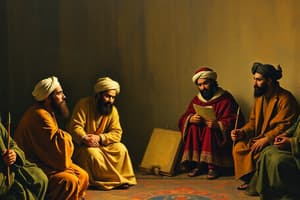Podcast
Questions and Answers
When did Muhammad begin receiving revelations from God?
When did Muhammad begin receiving revelations from God?
- At age forty (correct)
- At age twenty
- At age thirty
- At age fifty
What event marks the beginning of the Islamic calendar?
What event marks the beginning of the Islamic calendar?
- The Battle of Mecca
- The Year of Revelation
- The Hijra (correct)
- The Conquest of Medina
Where did Muhammad and his followers emigrate to in 622 CE?
Where did Muhammad and his followers emigrate to in 622 CE?
- Mecca
- Damascus
- Medina (correct)
- Jerusalem
Which region experienced rapid spread of Islamic rule after Muhammad's death?
Which region experienced rapid spread of Islamic rule after Muhammad's death?
During the Golden Age of Science and Culture, what areas experienced significant development?
During the Golden Age of Science and Culture, what areas experienced significant development?
Which dynasty did NOT rise under Islamic control during the spread of Islam?
Which dynasty did NOT rise under Islamic control during the spread of Islam?
During which period did European colonial powers establish colonies in regions where Islam had historically been dominant?
During which period did European colonial powers establish colonies in regions where Islam had historically been dominant?
What was one of the consequences of the weakening centralized authority represented by the caliphs?
What was one of the consequences of the weakening centralized authority represented by the caliphs?
Which civilizations' works were translated into Arabic during a specific era, preserving them for later generations?
Which civilizations' works were translated into Arabic during a specific era, preserving them for later generations?
What emerged to resist colonial domination during the modern period?
What emerged to resist colonial domination during the modern period?
What factor led to conflicts between different branches of Islam as the authority of the caliphs weakened?
What factor led to conflicts between different branches of Islam as the authority of the caliphs weakened?
What historical outcome resulted from the decline of the centralized authority represented by the caliphs?
What historical outcome resulted from the decline of the centralized authority represented by the caliphs?
Study Notes
Islam History: A Timeline of Key Events
Origins in Mecca
The origins of Islam can be traced back to around the year 618 CE when Muhammad was born into the Quraysh tribe in Mecca, Arabia. By age forty, he began receiving revelations from God through the archangel Gabriel. These revelations were eventually compiled and revealed by Muhammad over a period of twenty years, forming what is known today as the Quran, which Muslims consider the divinely inspired word of Allah.
Spreading the Message
In 622 CE, Muhammad and his followers emigrated to Medina, a city northwest of Mecca. This event, known as the Hijra, marks the beginning of the Islamic calendar. From this point onward, the message of Islam gained momentum, attracting many converts across the Arabian Peninsula.
Expansion in the Middle East
Muhammad died in 632 CE. After his death, Islamic rule spread rapidly throughout most of western Asia, North Africa, and parts of Europe due to the religious fervor generated among both Arabs and non-Arabic speakers who converted to the new faith. Over time, various states and dynasties rose and fell under Islamic control.
Golden Age of Science and Culture
From the late seventh century until roughly the early thirteenth century, the Muslim world experienced a golden age of learning and discovery. During this period, there was significant development in science, mathematics, astronomy, philosophy, literature, art, architecture, music, and commerce. Many works of ancient Greek, Indian, Persian, Chinese and other civilizations were translated into Arabic during this era, preserving them for later generations.
Decline of Caliphates
Over time, the centralized authority represented by the caliphs weakened, leading to conflicts between different branches of Islam. Eventually, political power fragmented, leading to the rise of independent kingdoms, sultans, and governors throughout the region.
Modern Period
During the modern period, colonialism played a major role in shaping the course of Islam. European powers such as Britain, France, Russia, Italy, Germany, Spain, Portugal, and Holland established colonies in regions where Islam had historically been dominant. Some countries, like Egypt, remained nominally independent while others saw their governments replaced with Western rulers. In some cases, local leaders allied themselves with foreign powers against rivals within the region. Meanwhile, nationalist movements emerged to resist colonial domination, often drawing upon Islamic symbols and themes in doing so.
Thus far, our journey through Islamic history has taken us from its humble beginnings in the Arabian desert to its global influence spreading across continents and centuries. As we continue to explore more aspects of this vast religion and civilization, it's clear that Islam's story remains deeply intertwined with broader historical events, cultural interactions, and complex human experiences.
Studying That Suits You
Use AI to generate personalized quizzes and flashcards to suit your learning preferences.
Description
Test your knowledge about key events in Islamic history, from the origins in Mecca to the golden age of science and culture, and the decline of caliphates. Explore the spread of Islam, its impact on various regions, and the influences of colonialism in shaping its modern period.




